|
Identifying companies
for the future or companies that stand a chance of global greatness-that
is what the 20 Companies To Watch In 2004 list is about-is a hazardous
job. Everyone, analysts, chief executives, bankers, consultants,
even, in these retro-is-good days, venture capitalists, is so caught
up in the here and the now (the next quarter, the year's order book,
next week's big meeting in New York) that it is difficult to compile
a listing of this nature. However, trying to put together such a
list presents an opportunity for business writers to do something
they very rarely do: look for signs (actually, even a suspicion
will do) of greatness in a company. This could be anything: a big
idea on how to do business differently, a great product, some intellectual
property, advantages of scale, geography, or labour-markets, or
a combination of any or all of these. Since this is the second year
that Business Today is running this list (the first appeared in
the issue of the magazine dated January 19, 2003, but was, for all
purposes, a 2002 listing), we've been brave enough to revisit companies
that made it to the first. Much to our relief, the inquest proved
satisfactory. Now, on to this year's 20.
-Sahad P.V.
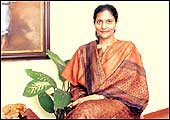 APOLLO
HOSPITALS APOLLO
HOSPITALS
PREETHA REDDY, Managing Director
The Eternal Bridesmaid
Healthcare has
been the next big thing on the Indian scene for some time now. When
(note, not if) the sector does make it, the company that will probably
gain the most from it is the Chennai-based Apollo Hospitals. That
would be poetic justice of sorts: the chain's first hospital, in
Chennai, was founded by its Chairman Dr Prathap Reddy in 1983, a
time when organised healthcare was an alien concept in India. Today,
Apollo owns 11 hospitals, manages 12 more (this number will increase
by 11 shortly), and boasts 6,000 beds. And it has already started
benefiting from the health tourism movement: patients from the UK,
West Asia, South Asia, even the US, fly to India to tap Apollo's
low cost, high quality service. "Today, the East is setting
better healthcare standards than the West," says Preetha Reddy,
the chain's managing director. The company has put its knowledge
to good use, winning hospital management contracts in Dubai and
Bangladesh. It even runs a Business Process Outsourcing outfit which
employs 500 and does back-office work for other hospitals like billing,
documenting clinical and administrative records, and coding medical
processes. None of this has come at the cost of profitability. Apollo
hopes to close this year with around Rs 500 crore in revenues and
Rs 42 crore in profits. Service and profits: that's the best of
both worlds.
-Nitya Varadarajan
AUROBINDO PHARMA
NITYANAND REDDY, CEO
Bulk Success
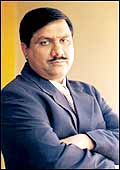 Given
the ripples created by Dr Reddy's, Ranbaxy, and Cipla in the global
domain, Aurobindo's presence on this list should surprise no one.
What should is the company's strategy. Like most other Indian pharma
companies Aurobindo has its eye on the US market for generics (drugs
that come off patent). Between 2005 and 2007 some $45 billion (Rs
2,06,302 crore) worth of drugs will come off patent in the US. Aurobindo's
strategy will help it benefit from this: its generics business should
see a spurt, and its bulk drugs business, which will supply ingredients
to generics makers, should make a killing. Aurobindo is already
the largest bulk drugs manufacturer in Asia (it even has a subsidiary
in China and a joint venture in the US) and this year $165 million
(Rs 756.4 crore) of its revenues of $325 million (Rs 1489.9 crore)
will come from exports. "More than focusing on discovering
new chemical entities, the emphasis of our research is on resolving
complex chemical challenges and applying new technologies for better
processes," says Srinivas Lanka, a director on the board of
Aurobindo. That's beginning to show. So much so that the company
(2002-03 revenues, Rs 1,214 crore; net profit, Rs 103.14 crore)
hopes to touch revenues of Rs 4,000-crore well ahead of its stated
deadline of 2006-7. Given
the ripples created by Dr Reddy's, Ranbaxy, and Cipla in the global
domain, Aurobindo's presence on this list should surprise no one.
What should is the company's strategy. Like most other Indian pharma
companies Aurobindo has its eye on the US market for generics (drugs
that come off patent). Between 2005 and 2007 some $45 billion (Rs
2,06,302 crore) worth of drugs will come off patent in the US. Aurobindo's
strategy will help it benefit from this: its generics business should
see a spurt, and its bulk drugs business, which will supply ingredients
to generics makers, should make a killing. Aurobindo is already
the largest bulk drugs manufacturer in Asia (it even has a subsidiary
in China and a joint venture in the US) and this year $165 million
(Rs 756.4 crore) of its revenues of $325 million (Rs 1489.9 crore)
will come from exports. "More than focusing on discovering
new chemical entities, the emphasis of our research is on resolving
complex chemical challenges and applying new technologies for better
processes," says Srinivas Lanka, a director on the board of
Aurobindo. That's beginning to show. So much so that the company
(2002-03 revenues, Rs 1,214 crore; net profit, Rs 103.14 crore)
hopes to touch revenues of Rs 4,000-crore well ahead of its stated
deadline of 2006-7.
-Nenkatesha Babu
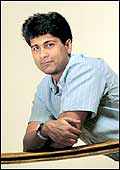 BAJAJ
AUTO BAJAJ
AUTO
RAJEEV BAJAJ, Joint Managing Director
Two-wheels Better
Eight years ago,
analysts were beginning to write Bajaj Auto's obit. Circa 2003,
Bajaj Auto is a constant in most listings of global Indian companies.
Attribute that to a slew of launches in the motorbike segment that
have seen it grab a respectable share (25 per cent, and this makes
it second, after Hero Honda) of the market. And attribute that to
an emphasis on exports. Three years ago, Bajaj would export 15,000
vehicles a year; today it does 15,000 a month. This year, exports
should contribute 8 per cent to estimated revenues of Rs 5,300 crore
(2002-03 net profit: Rs 535 crore). So, when Rajeev Bajaj, Joint
Managing Director, Bajaj, uses the term 'market' he is probably
referring to the 32 million units a year global one which he hopes
to tap through a strategy that involves exports, alliances with
long-time partner Kawasaki, even local manufacturing facilities.
Bajaj's cost structure and emphasis on quality, says the man, give
it an edge. "I am waiting for the day when we say our domestic
sales is 20 per cent of global turnover," grins Bajaj.
-Swati Prasad
BHARAT ELECTRONICS
Y. GOPALA RAO, CMD
Arms Dealer
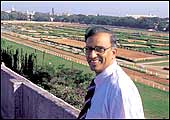 Purely
on the strength of numerical achievements, Bharat Electronics Limited
(BEL) qualifies for this listing: its turnover has trebled over
the past 10 years to Rs 2,508 crore in 2002-03; net profit grew
by more than eight times in the same period to Rs 260.6 crore; and
its stock is on fire on D Street. None of this matters as much as
the business BEL is in: defence and civilian communication and sensing
equipment. That counts for something. Not too long ago Israel-based
Elop was caught in a typical 'make or buy' dilemma involving hand-held
thermal imagers. The firm was impressed enough with BEL's grasp
of the opto-circuitry required to place an initial order worth $4
million (Rs 18.33 crore). "The real indicator isn't the order's
size," says Y. Gopala Rao who has just taken charge as bel's
chairman and managing director, "but the confidence reposed
by the customer in our ability to deliver customised solutions at
a competitive price". Exports currently constitute under 2
per cent of revenues, but Rao is confident they will grow to 10
per cent of revenues of Rs 5,000 crore by 2006-07. The emphasis
on research will help: BEL boasts a R&D team of around 1,300
and spends some Rs 125 crore on this every year. Now, if only the
company's largest shareholder, the government, would be a little
less coy about exports of military equipment. Purely
on the strength of numerical achievements, Bharat Electronics Limited
(BEL) qualifies for this listing: its turnover has trebled over
the past 10 years to Rs 2,508 crore in 2002-03; net profit grew
by more than eight times in the same period to Rs 260.6 crore; and
its stock is on fire on D Street. None of this matters as much as
the business BEL is in: defence and civilian communication and sensing
equipment. That counts for something. Not too long ago Israel-based
Elop was caught in a typical 'make or buy' dilemma involving hand-held
thermal imagers. The firm was impressed enough with BEL's grasp
of the opto-circuitry required to place an initial order worth $4
million (Rs 18.33 crore). "The real indicator isn't the order's
size," says Y. Gopala Rao who has just taken charge as bel's
chairman and managing director, "but the confidence reposed
by the customer in our ability to deliver customised solutions at
a competitive price". Exports currently constitute under 2
per cent of revenues, but Rao is confident they will grow to 10
per cent of revenues of Rs 5,000 crore by 2006-07. The emphasis
on research will help: BEL boasts a R&D team of around 1,300
and spends some Rs 125 crore on this every year. Now, if only the
company's largest shareholder, the government, would be a little
less coy about exports of military equipment.
-Venkatesha Babu
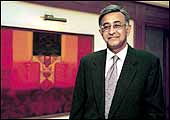 BHARAT
FORGE BHARAT
FORGE
BABA KALYANI, CMD
Thor's Hammer
Baba Kalyani, the
54-year-old Chairman and Managing Director of Bharat Forge, is back
in Pune after a short trip to Germany, where he had some business,
and New Delhi, where he attended the World Economic Forum's annual
India Summit. And the man looks pleased. The Delhi jamboree has
little to do with it. If Kalyani is happy, it is because he has
just acquired a German forging company, Carl Dan Peddinghaus (CDP).
And it is because a bet he made five years ago has worked out his
way. In 1998-99 Kalyani predicted that the centre of gravity of
the forging industry would shift to cost-competitive destinations
such as India. And so, he restructured Bharat Forge's operations
with an eye on cost, quality, and efficiencies. Today, the company's
revenues have increased to Rs 700 crore and exports are up to 42
per cent of turnover. The CDP acquisition has already made Bharat
Forge the world's second largest forging company, besides almost
doubling its turnover (CDP's revenues in 2002 were Rs 620 crore).
Once the integration is done, "we will look at acquisitions
in North America and China," says Kalyani. His strategy is
to marry the cost advantage of doing business in India with access
to technology (the CDP acquisition will provide this) and markets.
The man's strategy has worked in the past.
-Swati Prasad
BIO VEDA
VINITA JAIN, Chairperson
Herb Highness
 A
cosmetics brand cannot get any more global than having the UK's
Prince Charles and Hollywood star Demi Moore among its users. Biotique
is the brand, Bio Veda Technologies the company, and now that it
has reached a critical mass of some Rs 200 crore in sales (it is
growing at the rate of 30 per cent a year), both brand and company
seem set for greater things. It wasn't always this way. Back in
1984, when founder Vinita Jain, six ayurveda doctors, and two doctors
from Switzerland embarked on a research project to develop personal
care products from Indian herbs, most people thought she was out
of her mind. Eight years later, in 1992, Jain launched Biotique
as a for-exports brand. Today, Bio Veda exports its products to
more than 25 countries (40 per cent of its sales come from exports),
has a laboratory in Switzerland where it also plans to put down
a manufacturing facility by 2005, and boasts a US Food and Drug
Administration-approved plant in India. "Our whole idea is
to blend the ancient science of ayurveda and modern technology,"
says the 40-something Jain who grew up in her family's tea gardens
in West Bengal and has read ayurveda classics such as Shushruta
Samhita and Charak Samhita in the original Sanskrit. Success, we're
told, is spelt the same in most languages. A
cosmetics brand cannot get any more global than having the UK's
Prince Charles and Hollywood star Demi Moore among its users. Biotique
is the brand, Bio Veda Technologies the company, and now that it
has reached a critical mass of some Rs 200 crore in sales (it is
growing at the rate of 30 per cent a year), both brand and company
seem set for greater things. It wasn't always this way. Back in
1984, when founder Vinita Jain, six ayurveda doctors, and two doctors
from Switzerland embarked on a research project to develop personal
care products from Indian herbs, most people thought she was out
of her mind. Eight years later, in 1992, Jain launched Biotique
as a for-exports brand. Today, Bio Veda exports its products to
more than 25 countries (40 per cent of its sales come from exports),
has a laboratory in Switzerland where it also plans to put down
a manufacturing facility by 2005, and boasts a US Food and Drug
Administration-approved plant in India. "Our whole idea is
to blend the ancient science of ayurveda and modern technology,"
says the 40-something Jain who grew up in her family's tea gardens
in West Bengal and has read ayurveda classics such as Shushruta
Samhita and Charak Samhita in the original Sanskrit. Success, we're
told, is spelt the same in most languages.
-Sahad P.V.
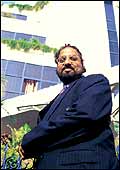 DIVI'S
LAB DIVI'S
LAB
MURALI K. DIVI, CEO
Playing By The Rules
Want to know why
Divi's scrip has appreciated over 700 per cent in five months?.
The Rs 300-crore company is set to benefit from the contract manufacturing
boom India will see post 2005. The country moves to the product
patent regime that year and multinationals are likely to outsource
production to India to cut costs. It helps that CEO Murali K. Divi
has announced his desire to respect IPRs (Intellectual Property
Rights). "This gives a lot of comfort to MNCs," says Tejas
Doshi, Head (Research) at Mumbai-brokerage Sushil Finance. Divi's
also supplies ingredients to generics manufacturers and makes peptides,
crucial to the emerging area of proteonomics. "Chemistry is
our core strength," says Divi. And playing by the rules, its
core philosophy.
-Sahad P.V.
HINDUSTAN INKS
YUNUS BILAKHIA, Chairman
Is This Its Ink?
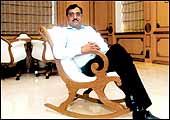 It
could be. After all unlikely success-story Hindustan Inks and Resins
supplies ink to the press where this magazine is printed. Unlikely
because no one could have imagined a printing inks company to grow
at a rate that would give most of India's software stars an inferiority
complex: in the 11 years between 1991-92 and 2002-03, Hindustan
Inks grew at a scorching CAGR of 67 per cent, growing its revenues
from Rs 2 crore to around Rs 600 crore. Today, the company is the
fifteenth-largest producer of ink in the world, has a wholly-owned
subsidiary Micro Inks in the US (a greenfield project), and has
set its sights on being one of the top five global players in its
business by 2008. "We have already beaten the MNCs in India,"
says Chairman Yunus Bilakhia. "We'll do this internationally." It
could be. After all unlikely success-story Hindustan Inks and Resins
supplies ink to the press where this magazine is printed. Unlikely
because no one could have imagined a printing inks company to grow
at a rate that would give most of India's software stars an inferiority
complex: in the 11 years between 1991-92 and 2002-03, Hindustan
Inks grew at a scorching CAGR of 67 per cent, growing its revenues
from Rs 2 crore to around Rs 600 crore. Today, the company is the
fifteenth-largest producer of ink in the world, has a wholly-owned
subsidiary Micro Inks in the US (a greenfield project), and has
set its sights on being one of the top five global players in its
business by 2008. "We have already beaten the MNCs in India,"
says Chairman Yunus Bilakhia. "We'll do this internationally."
-Sahad P.V.
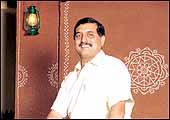 INDECOMM INDECOMM
NARESH PONNAPA, CEO
A Different BPO
Indecomm, rather
its Indian arm TRRs imaging, is the only Business Process Outsourcing
firm to figure in this year's listing and its presence will probably
be questioned. Well, the CEOs of most BPOs would probably give an
arm and a leg to be in the shoes of Naresh Ponnapa, the company's
CEO. "I am besieged by venture capitalists who want to invest
in the company," laughs the man. One reason for that is Ponnapa's
profile. The man in the fast track at HLL but decided to move on.
Another is the nature of Indecomm's work. It is focussed on transaction
processing in four areas: healthcare, banking, insurance, and financial
services. "We are a value-play, not a volume one," says
Ponnapa. And adds that the emphasis is on addressing the client's
'pain points'. It seems to have worked.
-Venkatesha Babu
INDIAN OIL CORPORATION
M.S. RAMACHANDRAN, CEO
The World's Petrol Station
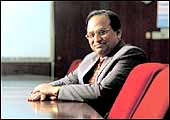 It
is already ranked 191 in the fortune 500, and is the country's biggest
refining and marketing company, but there are more, non-numerical
reasons to include Indian Oil Corporation (Rs 1,19,848 crore in
sales and Rs 6,115 crore in net profits in 2002-03) in this listing.
One is the company's efforts to reinvent itself as a "major
diversified transnational integrated company" to use the words
of M.S. Ramachandran, its Chairman and Managing Director. That doesn't
mean Ramachandran would like his company to target markets in North
America and Europe; he is happy focusing on ones in the neighbourhood
such as Sri Lanka, others farther away but with a sizeable Indian
population (Mauritius and South Africa), and a few African countries.
In Sri Lanka, for instance, IOC helped Ceylon Petroleum Corporation
refurbish its marketing network and has now entered the business
itself through a 100 per cent subsidiary. And it is managing terminals
and refineries in Nigeria, Madagascar, Zambia, and the Mauritius,
a process that it hopes will earn it goodwill enough in these countries
to translate into a marketing opportunity once the markets open
up. Coupled with its forays into exploration, these could help IOC
move into the Fortune 100 over the next couple of years as Ramachandran
wants it to. It
is already ranked 191 in the fortune 500, and is the country's biggest
refining and marketing company, but there are more, non-numerical
reasons to include Indian Oil Corporation (Rs 1,19,848 crore in
sales and Rs 6,115 crore in net profits in 2002-03) in this listing.
One is the company's efforts to reinvent itself as a "major
diversified transnational integrated company" to use the words
of M.S. Ramachandran, its Chairman and Managing Director. That doesn't
mean Ramachandran would like his company to target markets in North
America and Europe; he is happy focusing on ones in the neighbourhood
such as Sri Lanka, others farther away but with a sizeable Indian
population (Mauritius and South Africa), and a few African countries.
In Sri Lanka, for instance, IOC helped Ceylon Petroleum Corporation
refurbish its marketing network and has now entered the business
itself through a 100 per cent subsidiary. And it is managing terminals
and refineries in Nigeria, Madagascar, Zambia, and the Mauritius,
a process that it hopes will earn it goodwill enough in these countries
to translate into a marketing opportunity once the markets open
up. Coupled with its forays into exploration, these could help IOC
move into the Fortune 100 over the next couple of years as Ramachandran
wants it to.
-Ashish Gupta
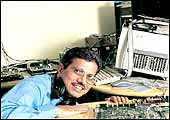 ITTIAM
SYSTEMS ITTIAM
SYSTEMS
SRINI RAJAM, CEO
DSPing The World
Can an Indian company
make it in the global chip design industry? Bangalore-based Ittiam
Systems thinks it can. First, some basics: digital signal processing
has to do with the digitisation of typically analogue information
such as video and audio; any chip that can do this is called a digital
signal processor; and DSPs typically end up in consumer electronics
appliances. Srini Rajam is a 17-year vet of the DSP and chip design
industry; in January 2001, the former head of Texas Instruments'
Indian ops founded Ittiam as a DSP-design company focussed on digital
video and audio, wireless LAN (Local area Network), and VOIP (Voice
over Internet Protocol). The timing wasn't great: the global chip
industry was facing a meltdown but Rajam says ''the tough market
conditions imposed discipline on us; and we focussed on things that
could bring us revenue streams''. Today, Ittiam boasts more than
30 IPs (Intellectual Properties; these and 10 patents in various
stages of approval were created from $5 million of initial funding)
and a growing list of companies (30, at last count) that pay to
use them. ''Our goal is to become the global leader in the DSP IP
space and to file at least 10 patents a year,'' says Rajam. It's
possible.
-Venkatesha Babu
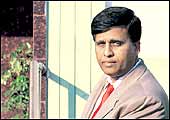 MOSCHIP MOSCHIP
K. RAMACHANDRA REDDY, Founder & CEO
Indian Tech's Hottest
No, it isn't software
product company i-flex we are referring to; our choice for the label
is Hyderabad-based MosChip, a chip company that has eight products
targeting the global consumer appliance and data communication markets
under its own name, with 10 more in the pipeline. Then, there's
the small thing about founder and CEO K. Ramachandra 'Ram' Reddy
being the individual credited with having designed the world's first
DSP way back in 1977. MosChip's design-to-delivery model is riskier,
but also more rewarding. Since it outsources manufacturing to UMC,
TSMC, and Flextronics (also an investor) it doesn't incur the killing
manufacturing overheads a small player otherwise would. ''It is
not improbable for a company of our size and focus to touch $500
million (Rs 2,292 crore) in revenues over the next seven to 10 years
with the right kind of management,'' says Reddy. As long as it gets
its marketing act right, that is.
-Venkatesha Babu
MPHASIS BFL
JERRY RAO, Chairman & CEO
The Second Wave
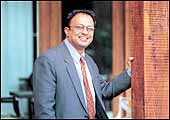 Jaithirth
'Jerry' Rao still remembers how, when Mphasis and BFL merged in
April 2000, the CFO of a large software company said, ''Two losers
coming together do not make a winner.'' Today, Mphasis bfl is the
sixth largest software company in India and its sales have increased
from $34 million at the time of the merger to $120-$125 million
(Rs 560-600 crore). Better still, it will end 2003-04 with Rs 100
crore in net profits. While the tech slowdown saw the gap between
Indian software's first-tier and second-tier widen, Mphasis BFL
bucked the trend. And it was a pioneer of sorts, bundling its services
and that of its BPO subsidiary MsourcE into an integrated whole
for clients. ''Our goal is to be a global company with a large Indian
footprint,'' says Rao. With centres in China and Mexico that seems
like a real objective, not just words. Jaithirth
'Jerry' Rao still remembers how, when Mphasis and BFL merged in
April 2000, the CFO of a large software company said, ''Two losers
coming together do not make a winner.'' Today, Mphasis bfl is the
sixth largest software company in India and its sales have increased
from $34 million at the time of the merger to $120-$125 million
(Rs 560-600 crore). Better still, it will end 2003-04 with Rs 100
crore in net profits. While the tech slowdown saw the gap between
Indian software's first-tier and second-tier widen, Mphasis BFL
bucked the trend. And it was a pioneer of sorts, bundling its services
and that of its BPO subsidiary MsourcE into an integrated whole
for clients. ''Our goal is to be a global company with a large Indian
footprint,'' says Rao. With centres in China and Mexico that seems
like a real objective, not just words.
-Venkatesha Babu
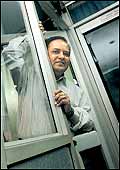 NALCO NALCO
C. VENKATRAMANA, CMD
Cost Warrior
Not too many public
sector companies boast a vision statement that speaks of ''becoming
a company of global repute''. But then, not too many public sector
companies would be able to advertise net profit margins of around
19 per cent on sales of Rs 2,718 crore. The numbers and the vision
statement could explain why C. Venkatramana, the Chairman and Managing
Director of NALCO, refuses to be drawn into a discussion on the
government's blow-hot, blow-cold approach to divesting its stake
in the company. Instead, the chain-smoking gent speaks at length
on the inevitability of NALCO becoming a global aluminum major.
A sampling: NALCO has the largest alumina production capacity in
Asia; it exports almost 55 per cent of its produce; and at Rs 5,717
a tonne, its cost of production is the lowest in the world. Healthy
reserves of the ore, proximity to coal mines and captive power plants
(its cost per unit is a mere Re 1) are behind the last. Once the
government gives its go-ahead, NALCO will spend Rs 4,100 crore (80
per cent will come from internal accruals) to up mining, refining,
smelting, and power production capacities. Phew!
-Ashish Gupta
SAMI LABS
RAJ BAMMI, President
The New-age Traditionalist
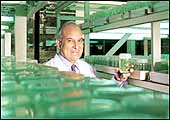 First,
a disclaimer: Sami Labs isn't in this list because the company is
in the hot area of alternative medicine (ayurveda, in this case).
Instead, the company makes it to the list of 20 companies to watch
because it brings the discipline of product- and clinical research
that is very much part of the allopathic way to ayurveda. Sami's
R&D facility in Bangalore has 100 scientists on its rolls, it
spends 9 per cent of its revenues on r&d (2002-03 revenues:
Rs 71 crore) and it even boasts a research facility in Princeton,
New Jersey. ''We conduct pre-clinical and clinical trials in the
US on the American population to develop credibility for the made-in-India
label,'' says Raj Bammi, President, Sami. The idea to market Indian
herbal medicine to Americans came to Sami's Founder and Chairman
Dr Muhammed Majeed when he was in the US in the early 1980s: allopathic
drugs were expensive and the only alternatives were Chinese or European
herbal medicine. Today, competition has intensified, but Sami's
credibility-building efforts have paid off. As has its investment
in research: it has nine international patents to its credit with
some 20 others in various stages of approval. Now, Sami is venturing
into areas like biotech and supercritical fluid extraction (a joint
venture with IIT Mumbai) to reduce costs and increase efficiencies
in its manufacturing process. This quaint mix of the new and the
old has spelt success for Sami. First,
a disclaimer: Sami Labs isn't in this list because the company is
in the hot area of alternative medicine (ayurveda, in this case).
Instead, the company makes it to the list of 20 companies to watch
because it brings the discipline of product- and clinical research
that is very much part of the allopathic way to ayurveda. Sami's
R&D facility in Bangalore has 100 scientists on its rolls, it
spends 9 per cent of its revenues on r&d (2002-03 revenues:
Rs 71 crore) and it even boasts a research facility in Princeton,
New Jersey. ''We conduct pre-clinical and clinical trials in the
US on the American population to develop credibility for the made-in-India
label,'' says Raj Bammi, President, Sami. The idea to market Indian
herbal medicine to Americans came to Sami's Founder and Chairman
Dr Muhammed Majeed when he was in the US in the early 1980s: allopathic
drugs were expensive and the only alternatives were Chinese or European
herbal medicine. Today, competition has intensified, but Sami's
credibility-building efforts have paid off. As has its investment
in research: it has nine international patents to its credit with
some 20 others in various stages of approval. Now, Sami is venturing
into areas like biotech and supercritical fluid extraction (a joint
venture with IIT Mumbai) to reduce costs and increase efficiencies
in its manufacturing process. This quaint mix of the new and the
old has spelt success for Sami.
-Venkatesha Babu
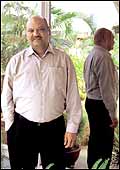 STERLITE STERLITE
ANIL AGARWAL, CEO
Man Of Mettle
It wasn't easy
deciding to fit this company here. Not that there was any argument
over whether or not Sterlite deserved to be on the list. As an up-and-coming
global non-ferrous major it was a shoo-in. The only debate was the
name it would go under. Would it be S for Sterlite or V for Vedanta
(the holding firm for all group companies that Agarwal will shortly
list on London Stock Exchange, after a $700 million issue)? Well,
we decided on S. You can read all you want to and then some about
Sterlite, Vedanta, and Agarwal elsewhere in this issue (See Man
Of Metal), but the company's presence here sets us wondering. What's
it with Indians and metal? There's Lord Bagri of London Metals Exchange
and L.N. Mittal of LNM Group. Last year's listing featured Hindalco.
And this year's features Nalco. We don't know the answer but would
just like to say that it certainly seems to be a case of the more
the merrier.
-Abir Pal
STRAND GENOMICS
SRINIVASAN SESHADRI, CEO
Algorithmist
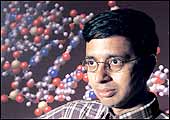 The
hype may be gone, but bioinformatics-the use of complex computational
techniques to simplify even more complex genetic and molecular research-remains
hot. Three years after it was spun off from the serene campus of
Bangalore's Indian Institute of Science by four professors, Strand
Genomics has three major products and 30 clients to show for its
efforts. K.P. Balraj, a director at West Bridge Capital Partners,
one of the venture capital firms that has invested in the firm,
says the background of its founders is Strand's biggest asset. "These
guys are among the very best in the world in areas such as image
processing, pattern recognition, visualisation, and complex systems
modelling." The three products launched by Strand thus far,
Spathika, an image analysis system, Avadis, a data mining software,
and Acuris, a workflow engine, bear this out. Strand's client list
may include the likes of Eli Lilly, Sequoia and Abgenics-all names
to reckon with in the life sciences space-but the company isn't
satisfied with this and is looking to expand its focus into areas
like semiconductor research and financial services. Both, you see,
could do with some algorithms. The
hype may be gone, but bioinformatics-the use of complex computational
techniques to simplify even more complex genetic and molecular research-remains
hot. Three years after it was spun off from the serene campus of
Bangalore's Indian Institute of Science by four professors, Strand
Genomics has three major products and 30 clients to show for its
efforts. K.P. Balraj, a director at West Bridge Capital Partners,
one of the venture capital firms that has invested in the firm,
says the background of its founders is Strand's biggest asset. "These
guys are among the very best in the world in areas such as image
processing, pattern recognition, visualisation, and complex systems
modelling." The three products launched by Strand thus far,
Spathika, an image analysis system, Avadis, a data mining software,
and Acuris, a workflow engine, bear this out. Strand's client list
may include the likes of Eli Lilly, Sequoia and Abgenics-all names
to reckon with in the life sciences space-but the company isn't
satisfied with this and is looking to expand its focus into areas
like semiconductor research and financial services. Both, you see,
could do with some algorithms.
-Venkatesha Babu
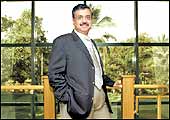 SUN
PHARMA SUN
PHARMA
DILIP SHANGHVI, CEO
Sunrise
We could get into
trouble for saying this, but of all the pharmaceutical companies
featured in this list, this year and last, Sun Pharma is probably
the strongest player in the domestic market. That's because the
company is what you'd call a boutique drugs manufacturer: it makes
specialty medicines for therapeutic areas such as cardiology, psychiatry,
neurology, and gastroenterology. Most of these drugs fall outside
the purview of the Indian government's price control laws, one reason
why Sun has consistently grown at least twice as fast as the industry.
However, Dilip Shanghvi, who founded Sun with Rs 10,000 and some
borrowed equipment, is unlikely to proffer this explanation as reason
for Sun's meteoric growth from a Rs 7.5 lakh company in 1983 to
a Rs 858 crore company today. ''We possibly work harder,'' he smiles.
Sun isn't oblivious to the generics opportunity either, the vast
amounts of money to be made by replicating drugs that go off patent.
Its US subsidiary Caraco is the vehicle that will do this. Caraco
has already filed two Abbreviated New Drug Applications-these are
mandatory for marketing generics-with the US Food and Drug Administration.
And Sun itself will chip in with five more by March next year. A
strong domestic play, and an emerging generics one in the US-that's
quite a combo.
-Sahad P.V.
TATA MOTORS
RATAN TATA, Chairman
Global Wheels
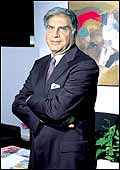 In
2000, barely a few months after its high-decibel launch, Tata Motors
Chairman Ratan Tata's dream, small car Indica, looked a loser. Its
quality was inconsistent and the company itself was bleeding under
a huge loss. Today, Tata Motors has started exporting the Indica,
badged CityRover to the UK under an agreement with MG Rover (over
the next five years it will ship 100,000), looks set to achieve
record profits, is bidding for South Korea's Daewoo Commercial Vehicle
Company, and has drawn up an aggressive globalisation blueprint.
And Ratan Tata is already articulating another dream, this one about
a Rs 1 lakh car. Clearly, Tata Motors is on a globalisation overdrive.
"This is only the first chapter of the relationship between
the two companies," says V. Sumantran, the head of the company's
passenger car business and its engineering research centre, referring
to the Rover alliance. "We plan to share products and jointly
develop car parts." "A Rover-like alliance for commercial
vehicles cannot be ruled out,'' adds Ravi Kant, the head of commercial
vehicles business. Already, Tata Motors is working on a new truck
platform that it will unveil in 2005, and modify according to the
market to which it is being exported. Think of it as a World Truck. In
2000, barely a few months after its high-decibel launch, Tata Motors
Chairman Ratan Tata's dream, small car Indica, looked a loser. Its
quality was inconsistent and the company itself was bleeding under
a huge loss. Today, Tata Motors has started exporting the Indica,
badged CityRover to the UK under an agreement with MG Rover (over
the next five years it will ship 100,000), looks set to achieve
record profits, is bidding for South Korea's Daewoo Commercial Vehicle
Company, and has drawn up an aggressive globalisation blueprint.
And Ratan Tata is already articulating another dream, this one about
a Rs 1 lakh car. Clearly, Tata Motors is on a globalisation overdrive.
"This is only the first chapter of the relationship between
the two companies," says V. Sumantran, the head of the company's
passenger car business and its engineering research centre, referring
to the Rover alliance. "We plan to share products and jointly
develop car parts." "A Rover-like alliance for commercial
vehicles cannot be ruled out,'' adds Ravi Kant, the head of commercial
vehicles business. Already, Tata Motors is working on a new truck
platform that it will unveil in 2005, and modify according to the
market to which it is being exported. Think of it as a World Truck.
-Swati Prasad
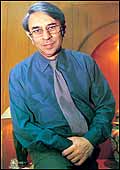 TATA
TEA TATA
TEA
HOMI KHUSROKHAN, Managing Director
A Strong Potion
It surely didn't
take a clairvoyant to pick this one. Kolkata-based Tata Tea has
everything going for it: a strong international brand (Tetley),
a diversified basket of products, acres of captive tea gardens,
competent managers, and even more savvy number crunchers. A year
ago, the company's acquisition of the UK's Tetley for $400 million
(Rs 1,840 crore) looked like a blunder. The acquisition is now being
cited as the master stroke that catapulted a sleepy Indian plantation
company into the global big league. Over the past three years, the
company has downed shutters on some plants, divested unprofitable
businesses, and moved some global manufacturing to its manufacturing
facility in Cochin. ''Costs have been kept on a tight leash while
existing assets are being optimally utilised through financial and
operational restructuring,'' says Jigar Shah, Head (Research) at
Mumbai-based brokerage K.R. Choksey Securities. The reliance on
global markets (in the UK and Canada Tetley is the market leader;
it is the fastest growing tea brand in Australia; and it has a 11.5
per cent share of the market in the US) has helped Tata Tea weather
a crisis in the domestic one. The only concern could be quality.
''Remember, while tea drinkers abroad might pay top dollar for their
beverage, they're equally finicky about quality,'' cautions Shah.
That's something for MD Homi Khusrokhan to contemplate over his
morning cuppa of steaming Darjeeling.
-Abir Pal
LAST YEAR'S 20
AND JUST WHERE THEY STAND NOW
ASIAN PAINTS
One more acquisition, this one in Fiji, consolidation, and an ego-boosting
stake acquisition in ICI India-it's been a good year.
AVESTHA GENGRAINE TECHNOLOGIES
Three subsidiaries in three geographies, and us patents for
its grain-resistant seeds-we're feeling vindicated.
BIOCON
The company is in the midst of an exercise to increase capacities,
and is preparing for its early 2004 IPO.
CIPLA
The company is still leading the charge for cheaper drugs
and looks set to benefit from the great generics opportunity.
DAKSH
What's different? Try 2,550 more people, 1,700 seats, and new clients,
including two leading airlines and a $2-billion hotel chain.
DR REDDY'S
An entry into Brazil and South Africa, more business in Europe,
and just that closer to becoming a discovery-driven global player.
GUJARAT AMBUJA
No major acquisitions, but its sales increased by 37 per
cent. Export sales grew faster, by 57 per cent to Rs 218.66 crore.
ESSEL PROPACK
CEO Cyrus Bagwadia resigns and is replaced by a member of
the Goel family that controls the company but the business is on
a song.
HDFC BANK
It is expanding its reach by the day and has addressed the
one gap in its portfolio by tying up with parent HDFC to offer home
loans.
HERO HONDA
The fact that Honda Motorcyle will launch motorbikes next
year is a concern, but the company has diversified into scooters.
HINDALCO
The acquisition of two copper mines in Australia has transformed
it into an integrated copper producer.
IFLEX
It's been an eventful year: New markets, new clients, a support
and solutions centre in London, and a marketing alliance with IBM.
INFOSYS
Surprise, surprise. Just when everyone was writing it off, the company
came back with stronger-than-strong results.
MOSER BAER
The company's share of optical media markets around the world increased
and it is now helping create standards for the nex-gen Blue Disc.
KSHEMA TECHNOLOGIES
The company took the inorganic route to growth by acquiring systems
integrator Singapore Computer Systems
ONGC
Its global strategy devolves around oilfields that are too small
for the Exxon Mobils of the world; still in gestation stage.
RANBAXY
Its us operation goes from strength to strength. With its China
plant kicking in, the company is now a true MNC.
RELIANCE INDUSTRIES
A growing telecom business, gains in exploration and a petroleum
marketing business waiting to kick off. Phew!
SHANTHA BIOTECHNICS
The company unveiled another product, the only recombitant human
interferon alpha 2B in the world. Jargon? Yes. Big thing? You bet.
WIPRO
Its results are beginning to look good again. It continues to acquire
companies and may be better placed to address the future.
|
